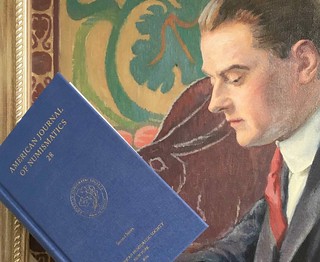
PREV ARTICLE
NEXT ARTICLE
FULL ISSUE
PREV FULL ISSUE
V25 2022 INDEX E-SYLUM ARCHIVE NUMISMATIC RESEARCH AND PEER REVIEWAnother (timely) American Numismatic Society Pocket Change blog article by Nathan Elkins discusses numismatic research and peer review. -Editor
In its most basic sense, peer review involves the selection of expert reviewers to read and critically evaluate a work before it is published. Reviewers are asked to remark on the merits of the manuscript, the soundness of methodology and interpretation, the novelty and level of contribution to scholarship, and to point out any errors of fact or shortcomings in the approach, analysis, bibliographical exploration, and so on. They are usually asked also to give a clear verdict, such as Editors of scholarly journals and book presses are keen to select reviewers who are especially conversant with the particular topic of the submitted manuscript, so as to get the highest quality feedback and assessment as possible. For example, this means that an editor would seek a different set of reviewers for an article publishing fourth-century CE excavation coins from Jordan than one would for a die study of Hadrianic aurei, a metallurgical analysis of cistophori, a technical study on the production of Connecticut coppers, or for a manuscript on religious symbols on Seleucid coins. Reviewers are, therefore, generally recognized authorities in their specific corner(s) of numismatic research, as established by their own track-record of peer-reviewed publications and sustained scholarship in particular areas. In numismatics and other historical disciplines, typically two or three peer reviewers assess any manuscript. A good peer-review process is usually double-blind, where the author's identity is shielded from the peer reviewer and vice-versa. While the peer-review process is imperfect, it is an important part of scholarly publication and is critical in maintaining rigor in the intellectual discourse. Some for-profit publishers have abandoned peer review, or greatly diluted the rigor of the peer-review process to the point of superficiality, and as a result publish low-quality content with flimsy methods and simplistic interpretations. One of the more egregious examples is that some predatory for-profit publishers who purport to conduct peer review send manuscripts to referees who have little or no qualifications in the subjects they are reviewing (I and other colleagues in ancient history and archaeology are often spammed weekly with invitations to review articles in subjects such as physics or biology by such venues, and colleagues in the sciences are similarly targeted by them to review manuscripts far outside their areas of advanced training and experience). Even if a for-profit publisher has a peer-review process, not only does it often differ from the traditional model in not-for-profit academic publishing, the for-profit model itself can incentivize a less rigorous process, as more published works equals more fees charged to authors and subscribers and, therefore, more income. Scholarship not seriously vetted by expert peers and published without the recommendation of quality referees also damages the field, as journal publications and books are how new knowledge is disseminated to colleagues and the interested public. It is very difficult for students and the public to distinguish between what is sound and vetted research versus what is not, as the imprimatur of a journal or a press signals legitimacy, even if there is little quality control behind it, which is why rigorous peer review is so essential. The American Numismatic Society is a leading publisher of critical numismatic scholarship through its prominent monograph series and internationally recognized journals, the American Journal of Numismatics (AJN) and Journal of Early American Numismatics (JEAN). Our cadre of peer reviewers helps us to maintain high standards and protect the integrity of our publications program in the advancement of numismatic scholarship, and we and our authors owe them a debt of thanks. The E-Sylum is a moderated weekly discussion forum. We're a place to discuss numismatic news and research as well as ideas and opinions. I'm always gratified to see actual peer-reviewed journals such as The Numismatist and Journal of Early American Numismatics highlight and republish information and thoughts that first came to light here. It's a credit to the high quality of contributions by our knowledgeable readers. -Editor
To read the complete article, see:
Wayne Homren, Editor The Numismatic Bibliomania Society is a non-profit organization promoting numismatic literature. See our web site at coinbooks.org. To submit items for publication in The E-Sylum, write to the Editor at this address: whomren@gmail.com To subscribe go to: https://my.binhost.com/lists/listinfo/esylum All Rights Reserved. NBS Home Page Contact the NBS webmaster 
|

